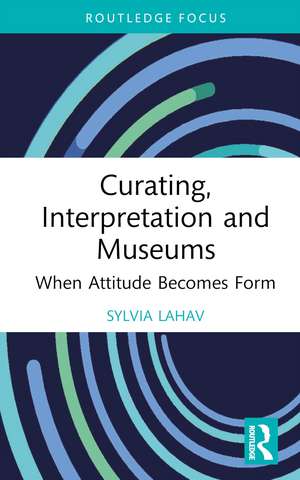Curating, Interpretation and Museums: When Attitude Becomes Form: Routledge Focus on the Global Creative Economy
Autor Sylvia Lahaven Limba Engleză Hardback – 9 mar 2023
| Toate formatele și edițiile | Preț | Express |
|---|---|---|
| Paperback (1) | 151.98 lei 3-5 săpt. | +4.76 lei 4-10 zile |
| Taylor & Francis Ltd. – 30 ian 2025 | 151.98 lei 3-5 săpt. | +4.76 lei 4-10 zile |
| Hardback (1) | 384.68 lei 3-5 săpt. | +15.01 lei 4-10 zile |
| Taylor & Francis – 9 mar 2023 | 384.68 lei 3-5 săpt. | +15.01 lei 4-10 zile |
Preț: 384.68 lei
Nou
73.63€ • 80.01$ • 61.89£
Carte disponibilă
Livrare economică 01-15 aprilie
Livrare express 15-21 martie pentru 24.100 lei
Specificații
ISBN-10: 1032081414
Pagini: 88
Dimensiuni: 138 x 216 x 6 mm
Greutate: 0.25 kg
Ediția:1
Editura: Taylor & Francis
Colecția Routledge
Seria Routledge Focus on the Global Creative Economy
Locul publicării:Oxford, United Kingdom
Public țintă
PostgraduateCuprins
1. Collecting, Exhibiting and Curating 2. Interpretation and Text 3. Space and Place 4. The Will to Know. Looking Back ¿ Final Thoughts
Notă biografică
Sylvia Lahav is an associate lecturer at Goldsmiths, University of London, an independent museum consultant, researcher and writer.
Descriere
Following a period of strategic and ideological change in museums, this book outlines new attitudes in curating and display, education and learning, text and interpretation, access, inclusion, participation, space, and the issues around the sustainability of the encyclopaedic collection.
Focused on the contemporary period, the author questions the extent to which the museum visitor has become reliant on interpretative text and examines the development of new museum spaces where visitor interaction and engagement is welcomed. Changes of attitude have transformed our museums into modern spaces that reflect current needs and modern expectations and yet our permanent collections remain relatively unchanged, sometimes an uncomfortable reminder of a time when values, ethics, and attitudes were very different. The author will discuss these conflicts of ideology.
Written by a researcher with expertise in museum practice, this shortform book offers a new approach that will be valuable reading for students and scholars of cultural management and policy, as well as providing insights for reflective museum practitioners.














